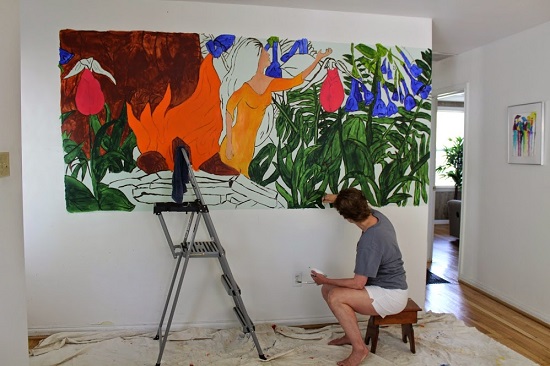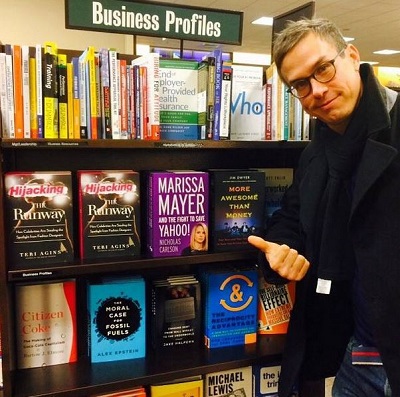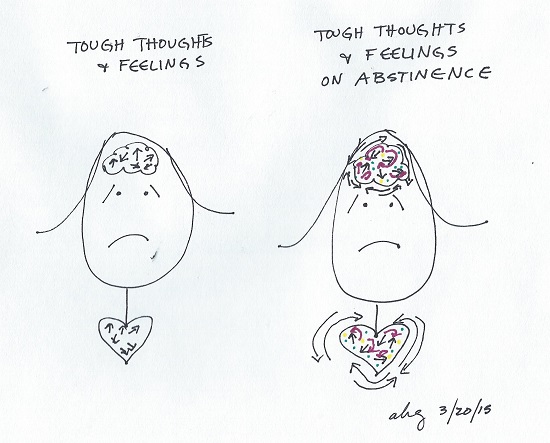Dear You,
You know who you are.
Your job, your only job, is to do whatever it takes to not.
Not take the first drink, not take the first hit, not make the first move toward food, keyboard, razor blade, whatever ails you.
Because for you, not for all, the first necessitates the second. Then the third. And so on.
I hear you that you absolutely understand that now. And it will be different this time. Just a few sips or hits or lines to calm you down. Nothing more than that. Now that you know what’s up with you, you really understand it, you can just do a little then stop yourself this time.
I hear the logic in it. It makes sense.
What is illogical and senseless is not you. It’s the different hold that this thing has on you than it does on others.
Once started, you think you can stop, they think they can stop. They stop, you don’t. It’s that simple.
What is wanted to be done cannot be done.
My heart goes out to you. I’ve got it, too.
It feels impossible to me that my own mind cannot make me do what I want to do.
When I awaken having lain my head on my arm for too long, I can use my mind and will my arm to rise, but it won’t. It’s asleep and no longer works as it did. Wine is like that for me. It’s just a beverage within arm’s reach. But when I drink it, no matter how I concentrate and will it to drink it as I once did, it no longer works the same way. Unlike my arm which wakes up in a few minutes, my mind’s relationship with alcohol stays numb. I tried for years to not lift my arm for a drink. The evidence is in. Once I start drinking, my mind can’t stop me. So I have to not start.
I hear you wishing you didn’t have this, that you could go back to the way it was, or, better, have it the way you want it to be – drink, use, do as you specify. Just right for you, no problems for you, no problems for others.
Sorry. In this way, you’re not like others who can set standards and meet them. You set them with heartfelt altruism and rational logic. And then you don’t meet them. Over and over and over again. In this way at least, you are different from others.
And this is the heartbreaker of not being able to stop once started – let’s call this condition “addiction” for lack of a better term: it makes you different. Humans are born desperate for connection – our survival depends upon it. And, now, here we are, disconnectedly different from others. It feels like we have to live on the edge of the village, taking whatever scraps the “real” villagers will throw us.
I hear you. Yes. It sucks.
That we’re having this conversation at all, though, speaks volumes about the hold this has on us. Real villagers don’t have extensive conversations about substances and processes they can’t stop using or can’t stop doing. I was a real villager once and I remember talking with people about what we were using and doing to build lives, relationships, businesses, communities. We aren’t talking in those terms, are we?
Today, I’ve been without a glass of wine – or any other alcoholic beverage – for 842 days. I can tell you that, if you can hang in there, it does get better. I feel better, and I’ve seen others feel better, as each day passes without the thing that we can’t not do.
And, this has taken awhile, but I don’t feel so different anymore. I’m still me. And there are a bunch of village edge dwellers just like I am and I am not floating in disconnected chaos, but hand-in-hand, shoulder-to-shoulder with them, building bridges back to the village and to spectacularly new places, too.
To keep me, though, and to keep connected with everyone, I have to not take the first drink. If I take it, then I’ll have to take the second. And the third. And that thing that has more power over me than I would ever have thought or wished could be possible will take me over again.
Join me. Do absolutely whatever it takes, no matter how upset you feel, no matter how crazy-feeling you get, to not. Reach out your hand for my hand and for all the hands reaching out to you to hold you, to comfort you, to pat you on the back while you go through the very hardest part – not, then not again, then getting used to not.
Reach out your hand.
Photo by Jackie Harder of Anne painting.
The content of this post is for informational purposes only and is not a substitute for medical or professional advice. Consult a qualified health care professional for personalized medical and professional advice.






